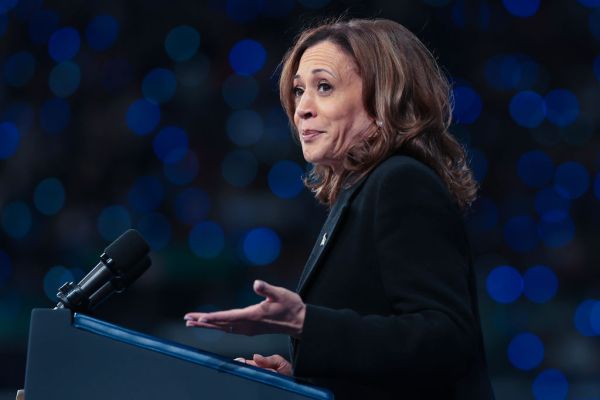Legacy conservative media sometimes has the feel of an old operating system straining to run new software it wasn’t designed for.
All of American media has had that problem since 2015. If you program an OS to process politics within certain parameters and then you download a piece of malware like Donald Trump, the computer’s going to start smoking and occasionally spitting out gibberish.
In the case of legacy conservative media, the OS tries to process Trump through the pathways of familiar right-wing grievances.
Take, for example, the extreme caterwauling about ABC News fact-checking him but not Kamala Harris at last week’s debate. Traditional conservatives are sensitive to debate moderators putting a thumb on the scale for Democrats, to the point that a single well-delivered rant about liberal bias once propelled Newt Gingrich to victory in a key presidential primary. Trump didn’t lose the debate because of liberal bias, but it’s understandable that the OS would revert to processing his defeat that way.
Traditional conservatives are also sensitive to double standards in the press about political violence. One can’t have witnessed the hysterical vilification of Sarah Palin after the attack on Gabby Giffords in 2011 and subsequent non-vilification of Bernie Sanders after the attack on Republican congressmen in 2017 without smelling a rat. To my memory, the latter story barely lasted a week as a topic of intensive coverage even though it involved the attempted mass murder of federal lawmakers.
The journalist class is liberal so it regards violence perpetrated against Democrats as more alarming and more likely than violence against Republicans. When, for the second time in two months, some nut schemes to assassinate Donald Trump, conservative commentators will inevitably worry that inflammatory left-wing rhetoric once again isn’t being taken as seriously by the press as its right-wing counterpart.
On Monday, Brit Hume of Fox News framed the issue this way: “If Donald Trump is held responsible for Jan. 6 because of his allegations that the 2020 election was stolen, is it unfair, after two assassination attempts, to hold responsible the Democrats who have ceaselessly claimed Trump is a threat to democracy?”
In the past, accusing the Republican nominee for president of being a “threat to democracy” really would have been recklessly inflammatory. But laying aside whether Trump has been “held responsible” for the insurrection in any meaningful way (particularly by his own party), Hume’s question strikes me as another case of an old OS trying to run software it wasn’t designed to run.
Answering it requires answering another question: Is it true?
Because if it’s true that Trump is a threat to democracy, and if conservative media nonetheless insists on discouraging that truth from being told, that’s a case of extreme media corruption in its own right.
Good faith and bad.
When both political parties are operating in good faith, there are two ways the media can demonstrate good faith itself in reporting on political violence. One: They can hold the provocateurs on both sides responsible for riling up the crazies. Two: They can hold the provocateurs on both sides harmless for riling up the crazies, maintaining that violent people are ultimately responsible for their own actions.
I prefer the second approach. Under the first, we’re morally bound to make political discourse so wan that even the most excitable nuts among us will struggle to find anything in it to overreact about. You’ll never get a writer to go along with that. But whichever approach you favor, it needs to be followed evenhandedly. It can’t be that Republican provocateurs are to blame when right-wing loons act out but Democratic provocateurs aren’t when left-wing loons do.
What do you do when one party isn’t acting in good faith, though?
That’s the question that continues to fry legacy media’s outdated operating systems, especially on the right. Implicit in Brit Hume’s formulation is the idea that Trump and the Democrats who accuse him of being a threat to democracy have equally good or bad intentions, making it unfair to blame one but not the other. The old OS is still processing Trump as a basically normal Republican politician (albeit with some eccentricities) who’s broadly in line with American civic traditions.
But he isn’t. And forgive me for wondering at this late date whether insisting on treating him like one is less a case of an outdated OS struggling with new software that’s not so new anymore than a deliberate ploy to excuse his habit of incitement.
When assessing whether inflammatory rhetoric is defensible or not, one should start with the question I asked above: Is it true?
Trump’s sketchiest incitement rarely is, although sometimes he’ll hit upon something that does check out. For instance, when he accuses immigrants of murdering American citizens, there are actual cases he can point to that back him up. Those attacks might be demagogic insofar as they taint an enormous group with the sins of its worst actors, but the truth of the critique makes it effective enough to have compelled Joe Biden to utter the name of one of those murder victims during this year’s State of the Union address.
It’s true that some immigrants commit violent crimes. And because it’s true, I wouldn’t ask Trump to stop talking about it because of how a hypothetical mental patient might react. You’re allowed to tell the truth in America, even if it raises the risk of people getting hurt.
Trump’s problem is that he’s indifferent to the truth or falsity of his demagoguery. “The election was rigged” wasn’t true. “Haitian immigrants are eating pets” isn’t true. Many people tried to correct him on both points and were ignored or derided. All politicians lie but those are big, brazen, I-don’t-care-if-the-country-burns-so-long-as-I-get-my-way lies. When you tell a lie like that and a cop at the Capitol ends up getting brained with a flag pole by a nut in a MAGA hat because of it, you’re guilty of something worse than the usual negligence toward the truth that politicians display.
And it’s not wrong for the press to recognize that greater culpability by holding you more responsible for the behavior of those whom you’ve incited.
The fact that Trump practices his own blatant double standard with respect to inflammatory speech also contributes to the media’s willingness to blame him for his supporters’ excesses, I think. “We cannot tell the American people that one candidate is a fascist,” J.D. Vance intoned on Monday in blaming the latest assassination attempt on Democratic rhetoric … less than two weeks after Trump himself accused Kamala Harris of embracing fascism—and communism, and Marxism—in a speech.
Last year, in a Veterans Day(!) address, Trump pledged “that we will root out the communists, Marxists, fascists and the radical left thugs that live like vermin within the confines of our country that lie and steal and cheat on elections.” Sounding increasingly Germanic, he continued, “The threat from outside forces is far less sinister, dangerous, and grave than the threat from within. Our threat is from within.”
The old conservative media OS on which Brit Hume runs isn’t programmed to process stuff like this from its leaders. Just yesterday, in an interview about the assassination plot, Trump said of Harris and Biden, "These are people that want to destroy our country. … It is called the enemy from within. They are the real threat."
He has no moral objection in principle to inflammatory allegations about political opponents, demonstrably. He has a moral objection to inflammatory allegations about him, in keeping with his worldview in which things that are good for Trump are Good and things that are bad for Trump are Bad. Go figure that the mainstream press would conclude that when right-wingers threaten Democrats, they do so with a degree of approval (or unconcern) from the top that’s uncommon among American politicians.
Trump’s defining political characteristic, the one that sets the tone for the institutional culture of his movement, is that he disdains norms. That being so, why shouldn’t an unusually lowbrow demagogue who works tirelessly to encourage blind loyalty among his supporters bear more blame for incitement than an uncharismatic mainstream liberal like Biden or Harris?
If you run your political party like a party, you’ll be treated like a politician when one of your supporters goes off. If you run it like a cult, you’ll be treated like a cult leader.
Words and deeds.
What about the other side of Hume’s question, though? Is it true, as so many Democrats insist, that Trump is a threat to democracy?
For an argument in the affirmative, you can read practically any of the 400-plus columns in the archives of this newsletter at random. But if you want to save yourself some time, skip the words and focus instead on Trump’s deeds. He’s the only president in American history to have attempted a coup, and he’s still justifying that attempt in 2024.
Here again the old OS of legacy conservative media runs into trouble. “George W. Bush wants to end democracy” was a baseless claim, easily rejected as a form of hysterical bias. “The cartoonish authoritarian who tried to overturn the last election on false pretenses will connive to stay in office when his next term is up” is harder to dismiss. How are we supposed to scold Democrats for irresponsibly accusing Trump of threatening democracy after he actually did threaten democracy? They have the receipts.
Hume’s question is essentially self-refuting, in fact, as others have noted. If you believe Trump is responsible for an insurrection that aimed to halt the transfer of power then you necessarily agree with Democrats that he’s a “threat to democracy.” Shouting “fire!” in a crowded theater isn’t irresponsible if there really is a fire, Jonah Goldberg pointed out in his Los Angeles Times column today.
There is a fire. It’s still burning.
Trump reiterated at the debate that he doesn’t accept that he lost in 2020. He has described the January 6 rioters who tried to keep him in power as “hostages” and has promised to grant clemency to some of them. Last week the Department of Homeland Security designated January 6 of next year as a “National Special Security Event,” fearing what he might say or do to overthrow the incoming government if Harris prevails in November. House Democrats are already fretting about how Speaker Mike Johnson could obstruct certification of the results on that day if the GOP retains its majority in this fall’s elections.
As recently as last week Trump declared that as president he’ll prosecute anyone who cheats in the upcoming election. And by cheaters, he didn’t just mean those who cast illegal ballots; he said he intends to target “Lawyers, Political Operatives, Donors, Illegal Voters, & Corrupt Election Officials.”
The civic threat from the leaders of the two parties simply isn’t symmetrical. This isn’t a case of trying to derive cryptic intent from the crosshairs symbol on an election map; Trump is directly incentivizing criminal behavior that might aid his return to power and intimidating public officials whose lawful behavior might impede it. Jonathan Chait responded to Hume’s question about the assassination attempts on Trump with this pregnant hypothetical: “What if Harris was relentlessly praising the shooters, calling them 'hostages,’ and promising to pardon them?”
The old conservative media operating system wasn’t built to rationalize coup plots, let alone coup plots that extend across multiple election cycles. But if you’re running the old OS, which requires you to believe that the party to which you belong is still more or less as normal as the other party, there’s no way to explain the corresponding asymmetry in how the mainstream press covers incitement except as an expression of illicit bias.
There’s another element of Trump’s politics that the whining about double standards conveniently fails to account for. He’s always had a thing for political violence, especially when it’s committed on his behalf.
No other mainstream American politician in my lifetime, left or right, could have inspired a list like this one. Trump was supposedly heard saying on January 6 that his vice president deserved to be hanged by the mob for refusing to halt the proceedings, and he allegedly was “delighted” at the spectacle of his followers battling cops to breach the Capitol. His former defense secretary claims that he wanted protesters outside the White House in 2020 to be shot. Earlier this month he hyped his plan to deport illegal immigrants en masse by promising it’ll be “a bloody story.”
Fair treatment requires treating like things alike. Is the mainstream media treating like things alike with respect to incitement if it holds a man who wishes harm to his enemies and has repeatedly communicated that fact privately and publicly to the same standard as more traditional politicians? Particularly after he proved in the winter of 2020 how far he was willing to go, day after day and week after week, to keep his supporters incensed about a phantom plot to depose him?
The proper response to an assassination plot against Trump is to order lots more Secret Service protection for him and to remind oneself that a society can’t murder its way out of a democratic crisis, not to pretend that there is no crisis or that the leaders of the two parties are equally enthusiastic about it. Chait correctly noted in his own piece on inflammatory rhetoric that exploiting the latest attempt on Trump’s life to discourage fair criticism is itself an authoritarian tactic: In the name of internal security, his defenders demand that his adversaries stop telling the truth about him.
But you’re allowed to tell the truth in America, even if it raises the risk of people getting hurt.
It’s fitting that Trump’s most outspoken advocate about the alleged incitement against him has been J.D. Vance, a man who wondered himself in better days whether Trump might turn out to be “America’s Hitler” and who’s now running point for him on the Haitians-eating-cats mega-smear. Unlike legacy conservative media, J.D. long ago upgraded his own political OS and is now running the lousiest populist software available. On Monday he published a dissertation-length indictment of Democrats and the press for exaggerating the threats made against Haitians in Springfield, Ohio, that included this passage:
If anything, covering the bomb threats gives whoever makes them exactly what he wants: attention. The purpose is distraction and shame. How dare you talk about the problems of Haitian migration in Springfield? You're endangering people, simply by discussing the problems of Kamala Harris's policies. It's a form of moral blackmail, designed not to make anyone safe but to shut everyone up.
That would be an interesting argument if the claims of cat-napping that he aggressively promoted were an example of actual “problems of Haitian migration,” as he put it, but since they aren’t, it’s best read as an ironic confession of his own cynical nonsense. Threatening democracy is an actual problem posed by Donald Trump, and rather than confront it forthrightly, Vance and much of conservative media prefer to believe that we’re endangering him simply by discussing that problem.
It's a form of moral blackmail, designed not to make anyone safe but to shut everyone up. I couldn’t have put it better myself. On Election Day this year, America gets an opportunity to run the civic equivalent of an antivirus program and remove the national malware. Let’s not miss that opportunity.







Please note that we at The Dispatch hold ourselves, our work, and our commenters to a higher standard than other places on the internet. We welcome comments that foster genuine debate or discussion—including comments critical of us or our work—but responses that include ad hominem attacks on fellow Dispatch members or are intended to stoke fear and anger may be moderated.
With your membership, you only have the ability to comment on The Morning Dispatch articles. Consider upgrading to join the conversation everywhere.